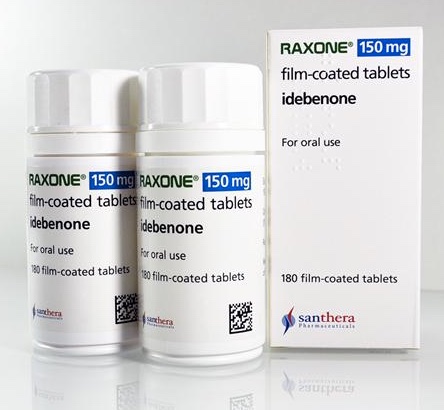Drug to Possibly Treat DMD, Idebenone (Raxone), Under CHMP Review in Europe
by |

 Santhera Pharmaceuticals reports that the European Medicines Agency (EMA) has validated its Marketing Authorization Application (MAA) for its drug Raxone (idebenone; U.S. brand name, Catena) as a treatment for Duchenne muscular dystrophy (DMD) in patients with respiratory function decline and who are not under glucocorticoid therapy.
Santhera Pharmaceuticals reports that the European Medicines Agency (EMA) has validated its Marketing Authorization Application (MAA) for its drug Raxone (idebenone; U.S. brand name, Catena) as a treatment for Duchenne muscular dystrophy (DMD) in patients with respiratory function decline and who are not under glucocorticoid therapy.
The EMA validation confirms that the company’s submission, filed as Type II variation of its existing marketing authorization for Raxone , is complete, and that the review process by the CHMP (Committee for Medicinal Products for Human Use) has commenced. Santhera expects a decision from CHMP in early 2017. Santhera has also initiated discussions with U.S. regulators, and is preparing to file for marketing authorization in North America.
DMD is characterized by a loss of the protein dystrophin, leading to cell damage, impaired calcium homeostasis, elevated oxidative stress, and reduced energy production in muscle cells. Idebenone is a synthetic short-chain benzoquinone and a co-factor for the enzyme NAD(P)H:quinone oxidoreductase (NQO1), capable of stimulating mitochondrial electron transport, reducing and scavenging reactive oxygen species (ROS), and supplementing cellular energy levels. According to the DMD advocacy ![]() group DuchenneConnect, idebenone works in Duchenne patients by increasing energy output of cell mitochondria, specifically acting as an electron carrier to provide additional electrons to mitochondria, which use them to generate energy. Idebenone can carry and drop off electrons within mitochondria numerous times, and also acts as an antioxidant to neutralize destructive free radical activity in cells. This helps dystrophic muscle cells maintain their cellular energy supply, which has been reduced as a result of lack of dystrophin, and protects cells from oxidative stress.
group DuchenneConnect, idebenone works in Duchenne patients by increasing energy output of cell mitochondria, specifically acting as an electron carrier to provide additional electrons to mitochondria, which use them to generate energy. Idebenone can carry and drop off electrons within mitochondria numerous times, and also acts as an antioxidant to neutralize destructive free radical activity in cells. This helps dystrophic muscle cells maintain their cellular energy supply, which has been reduced as a result of lack of dystrophin, and protects cells from oxidative stress.
 The MAA for Raxone was predicated on findings from the Phase 3 clinical trial of idebenone, DELOS (NCT01027884), in 64 Duchenne patients, ages 10-18, irrespective of mutation status and ability to ambulate. The study’s primary objective was to assess the efficacy of idebenone tablets (150 mg) in improving or delaying loss of respiratory function. Participants were randomized to receive a daily total of 900 mg of Raxone (2 x 150 mg, three times a day with meals) or a matching placebo for 52 weeks, and received hospital and home-based respiratory assessments.
The MAA for Raxone was predicated on findings from the Phase 3 clinical trial of idebenone, DELOS (NCT01027884), in 64 Duchenne patients, ages 10-18, irrespective of mutation status and ability to ambulate. The study’s primary objective was to assess the efficacy of idebenone tablets (150 mg) in improving or delaying loss of respiratory function. Participants were randomized to receive a daily total of 900 mg of Raxone (2 x 150 mg, three times a day with meals) or a matching placebo for 52 weeks, and received hospital and home-based respiratory assessments.
Findings were published in the journal Lancet (Buyse et al., The Lancet 2015 385(9979):1748-57) and in an open-access paper in the journal Neuromuscular Disorders, titled “Idebenone reduces respiratory complications in patients with Duchenne muscular dystrophy.“
Study co-authors note that respiratory disease continues to be a major cause of DMD morbidity and mortality, with progressive loss of respiratory function leading to restrictive pulmonary disease and placing patients at significant risk for severe respiratory complications. Of particular concern are ineffective cough, secretion retention, and recurrent respiratory tract infections
In the randomized and controlled DELOS trial, idebenone was observed to significantly reduce respiratory function loss, with participants receiving idebenone experiencing fewer bronchopulmonary adverse events, reporting less use of systemic antibiotics, and showing a significant reduction in loss of respiratory function over the one-year study period. The last DELOS patient visit occurred in January 2014 and the study wrapped up in April 2014.
In a post-hoc trial analysis, the investigators note finding that more patients in the placebo group, compared to the idebenone group, experienced bronchopulmonary adverse events (BAEs), indicating a clear idebenone treatment effect. Overall duration of BAEs was 222 days for those receiving a placebo, as opposed to 82 days for participants receiving idebenone therapy. In the placebo group, 13 patients (39.4%) reported using antibiotics 17 times, compared to seven treatment-arm patients (22.6%) reporting 8 episodes of antibiotic use. Moreover, patients in the placebo group used systemic antibiotics for a longer period (105 days) than those given idebenone (65 days).
The investigators conclude that their post-hoc analysis indicates that the protective effect of idebenone on respiratory function is associated with a reduced risk of bronchopulmonary complications, and a reduced need for systemic antibiotics. Raxone/Catena was deemed safe and well-tolerated by trial participants. DELOS met its primary endpoint and demonstrated the drug can slow respiratory function loss and reduce bronchopulmonary complications.
 “Validation of our submission by the EMA acknowledges the completeness of our dossier which combines data from our clinical program and supporting natural history data together establishing the clinical meaningfulness of Raxone treatment in DMD,” Thomas Meier, PhD, CEO of Santhera, said in a company press release. “Preservation of respiratory function is a major goal of DMD therapy and the initiation of the CHMP review of our MAA is an important milestone for patients with DMD who currently have no alternative treatment.”
“Validation of our submission by the EMA acknowledges the completeness of our dossier which combines data from our clinical program and supporting natural history data together establishing the clinical meaningfulness of Raxone treatment in DMD,” Thomas Meier, PhD, CEO of Santhera, said in a company press release. “Preservation of respiratory function is a major goal of DMD therapy and the initiation of the CHMP review of our MAA is an important milestone for patients with DMD who currently have no alternative treatment.”
Raxone is approved in Europe to treat visual impairment in adults and children, starting at age 12, with Leber’s hereditary optic neuropathy (LHON). In the U.S., the U.S. Food and Drug Administration (FDA) has designated idebenone an orphan drug as a potential treatment for both LHON and DMD.
More information can be found at Santhera Pharmaceuticals’ website: www.santhera.com.
Sources:
Santhera Pharmaceuticals
Neuromuscular Disorders
DuchenneConnect







